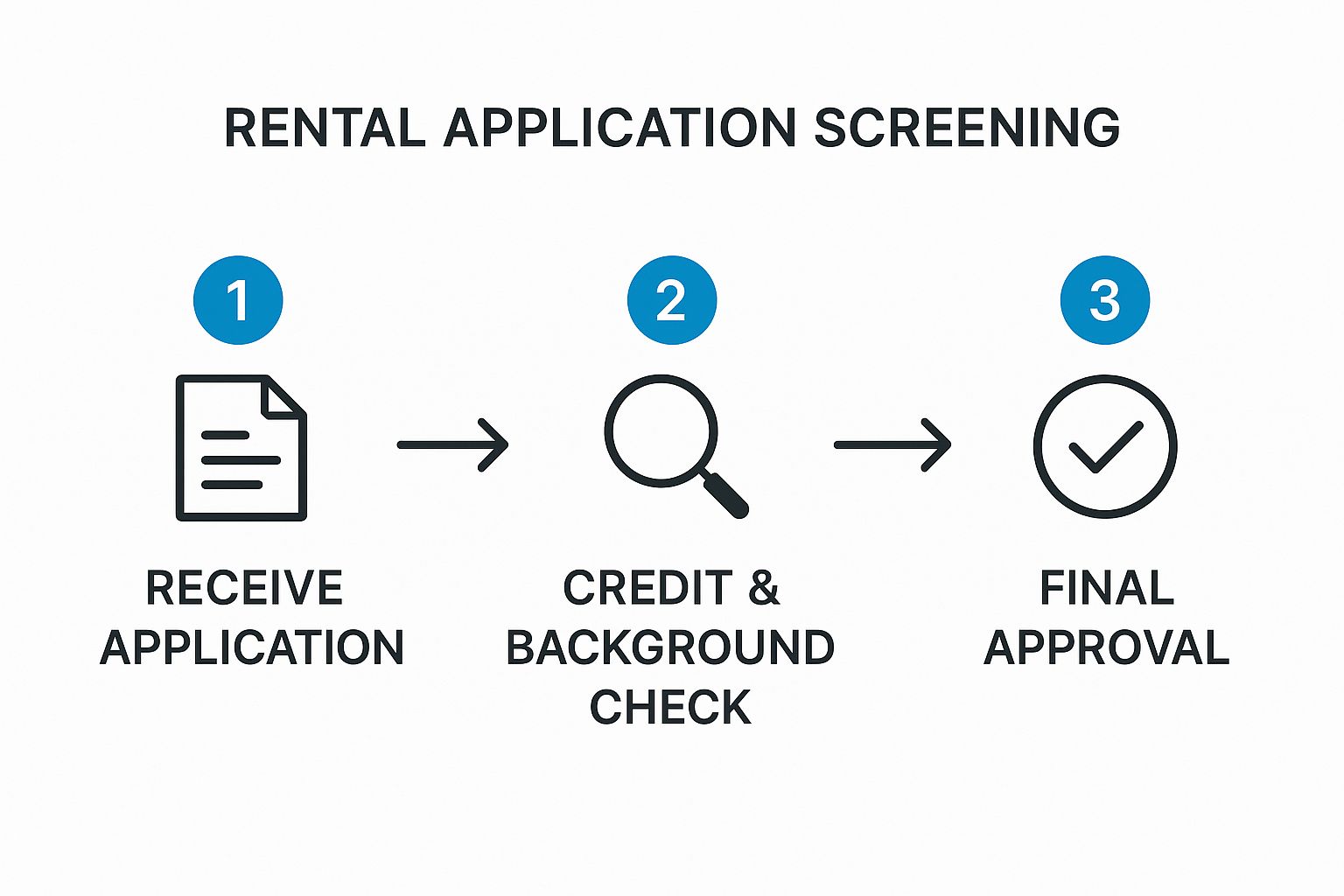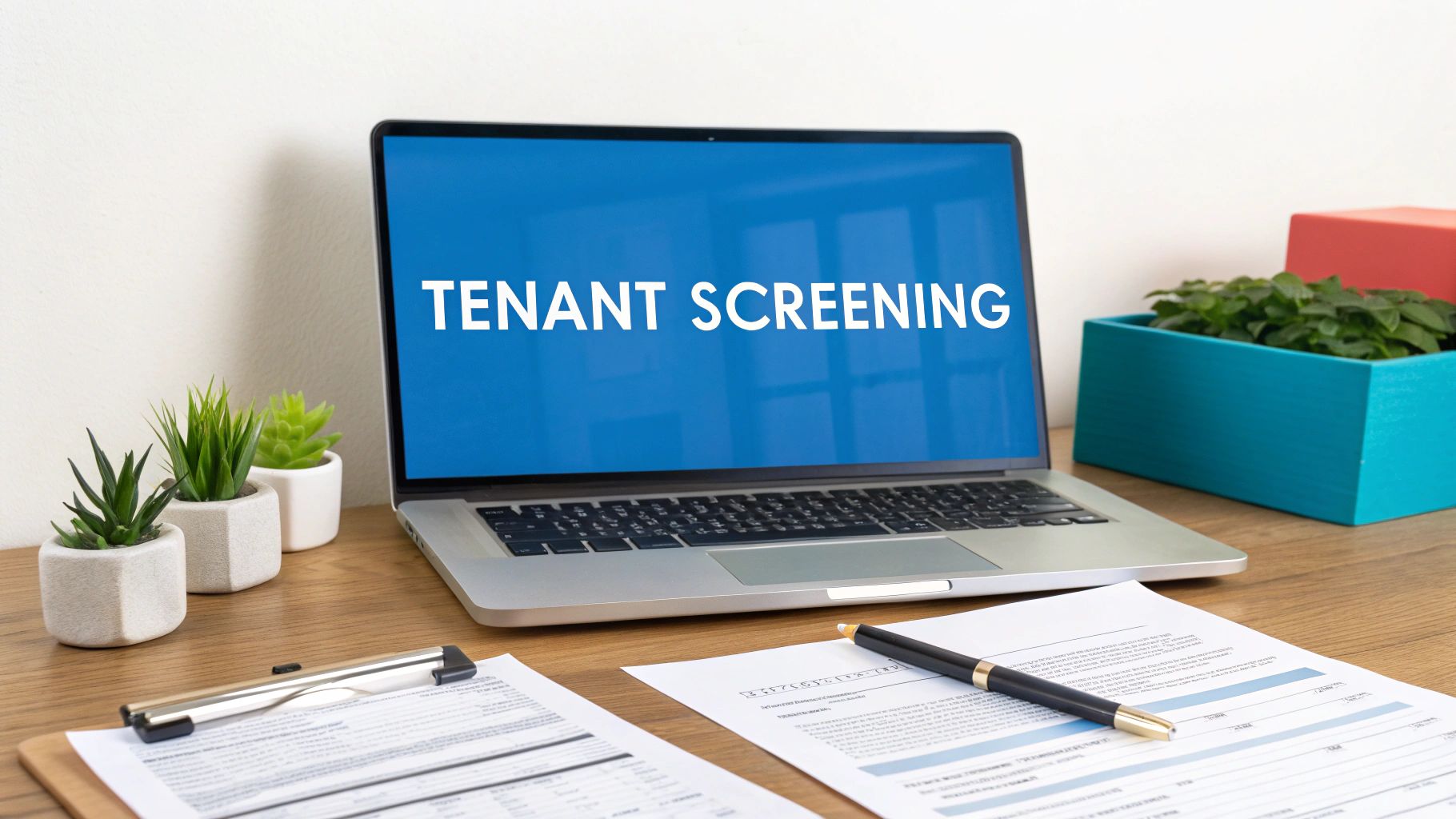A strong rental application screening process is your best defense against bad outcomes. I'm talking about costly vacancies, nightmare tenants who damage your property, and the legal headaches that can follow. It's not just about picking someone who seems nice—it's about creating a systematic, repeatable, and fair process for evaluating every single applicant.
Building Your Tenant Screening Framework
Before you even think about posting that "For Rent" sign, you need to build your screening framework. Seriously. This is the most important step. Think of it as your rulebook, ensuring every person who applies is measured against the exact same objective standards.
When you have your criteria defined and written down, you take the guesswork and personal bias out of the equation. That’s how you make confident, data-backed decisions that will stand up to scrutiny.
This isn't just a "nice-to-have" anymore. The demand for proper tenant screening is exploding as more landlords and property managers realize it’s the best way to protect their investment. The market was valued at USD 3.67 billion in 2023 and is on track to nearly double by 2032. You can dig into more data on this trend to see just how critical this has become.
Establish Your Core Rental Criteria
Your entire framework rests on a handful of clear, non-negotiable criteria. These are the pillars of your decision-making process. You're basically creating a "tenant scorecard" before the first application even hits your inbox.
Here are the key areas you absolutely need to define upfront:
- Income-to-Rent Ratio: The industry standard is requiring an applicant's gross monthly income to be at least 3x the monthly rent. This is a quick, easy way to see if they can comfortably afford the unit without financial stress.
- Credit History Benchmarks: Don't just pick a minimum credit score. Decide what kind of credit history is a deal-breaker. Are you okay with some old medical debt but draw the line at collections from a previous landlord or unpaid utility bills? Be specific.
- Employment Verification: How will you confirm their job and income? Decide if you'll require recent pay stubs, a formal offer letter, or if you plan to call their HR department directly.
- Rental History: What does a good rental history look like to you? Maybe you require positive references from their last two landlords and a clean record with zero prior evictions.
This is a great, simple visual of how the core screening steps flow together.

When you see it laid out like this, it’s clear how each step logically builds on the last, moving you from the initial application to a final, confident approval.
Before we move on, let's put those core criteria into a quick-reference checklist. Having these defined before you start accepting applications is non-negotiable for staying compliant and making fair decisions.
Essential Screening Criteria Checklist
This checklist isn't just a guide—it's your playbook for consistent, objective, and legally sound tenant screening.
Key Takeaway: Your screening criteria must be written down before you start marketing the property. Applying these rules consistently to every single applicant is your strongest defense against potential Fair Housing discrimination claims. It transforms your rental application screening from a subjective judgment call into an objective business process.
Staying Compliant with Fair Housing Laws

Navigating the legal maze of rental application screening is easily the most critical part of the job. This isn't just about dodging lawsuits; it's about running a fair, ethical, and sustainable business. The absolute cornerstone of compliance is the Fair Housing Act (FHA), which explicitly prohibits discrimination based on seven protected classes.
You must treat every applicant equally, regardless of:
- Race
- Color
- National Origin
- Religion
- Sex (this includes gender identity and sexual orientation)
- Familial Status
- Disability
It's surprisingly easy to step over the line. Even seemingly innocent questions can land you in hot water. Asking something like, "Is this a good neighborhood for kids?" could be seen as showing a preference for (or against) tenants with children, which is a direct violation of familial status protections.
Crucial Insight: Consistency is your best friend when it comes to compliance. Create your screening criteria in writing, and then apply it to every single applicant, every single time. No exceptions. This standardized approach is your strongest defense if your decision is ever questioned.
Building a Compliant Screening Scorecard
So, how do you enforce that consistency? A screening scorecard is a simple but powerful tool. It takes your pre-set criteria and turns it into an objective checklist. Every applicant gets scored on the exact same metrics, like their income-to-rent ratio, credit history, and what their previous landlords have to say.
This system takes gut feelings and personal bias out of the picture. Instead of thinking, "I have a good feeling about this person," you rely on cold, hard data. Did they meet the 3x income requirement? Yes or no. Do they have a prior eviction on their record? Yes or no. An objective process like this ensures your rental application screening is not only fair but also completely defensible.
Handling Criminal Histories and Adverse Actions
Screening for criminal history is one of the trickiest areas to navigate. "Ban the Box" laws are becoming more common in different cities and states, restricting when you can even ask about criminal records. As a rule of thumb, you should only consider convictions that are both recent and directly relevant—meaning they could pose a threat to the property or the safety of other residents.
If you ultimately decide to deny an applicant based on something you found in their background or credit report, you are legally required to send them an adverse action notice. This is a formal letter that explains the decision and provides the name and contact info for the reporting agency that supplied the information. This gives the applicant a chance to check their report for errors, a right protected by the Fair Credit Reporting Act (FCRA).
The importance of data security can't be overstated here, either. It’s a global concern, especially with strict privacy laws like Europe's GDPR setting a high standard for protecting tenant information. This has pushed the entire industry toward using secure, technology-based screening tools to stay on the right side of the law.
How to Read Credit and Background Reports

Alright, so your applicant has passed the initial sniff test and meets your basic criteria. Now comes the real detective work: digging into their credit and background reports. These documents are goldmines of information, telling a story far more detailed than any application form ever could.
Getting this part right is crucial for making a smart decision.
A credit score is just a snapshot, a single number that gives you a quick first impression. The real value is in the full report, which provides the why behind that score. It's easy to get hung up on a specific number, but I’ve learned to look for patterns. How has this person managed their finances over time?
For example, a low score from old medical bills tells a very different story than a score dragged down by multiple accounts in collections—especially if those collections are from utility companies or, even worse, other landlords. That’s a massive red flag you can't afford to ignore.
Decoding the Credit Report
First-timers often find credit reports overwhelming. They're dense. The trick is to break them down and look past the three-digit score. Your focus should be on the tradelines, collections, and any public records.
- Payment History: Is there a consistent pattern of late payments? One 30-day late payment a year ago is one thing; chronic lateness across several accounts is another. It’s a strong hint that rent might not always be on time.
- Debt-to-Income (DTI) Ratio: The report lays out their total debt, and you already have their income from the application. If their DTI is sky-high, it means a huge chunk of their money is already spoken for. That can put a serious squeeze on their ability to pay rent.
- Collections and Judgments: This is where I pay closest attention. I’m specifically looking for collections from other property management companies or utility providers. In my experience, this is one of the single most reliable predictors of a high-risk tenant.
Here’s a look at how a report details an applicant’s payment history and account status.

As you can see, it gives you a clear picture of how they handle their financial commitments.
Expert Tip: Remember, not all debt is bad debt. Student loans or a mortgage (installment debt) are very different from thousands of dollars in high-interest credit card debt (revolving debt). The type of debt they carry gives you important clues about their financial discipline and priorities.
Evaluating the Background Check
The background check provides the other half of the story, and it’s just as important. When you’re reviewing criminal history, you have to walk a fine line to stay compliant with Fair Housing laws.
The key is to only assess convictions that are recent and relevant—meaning, they pose a potential risk to the property or the safety of other residents. You need a written, consistent policy for this.
For instance, you might decide a minor offense from a decade ago isn't a concern, but a recent conviction for property damage or a violent crime is an automatic disqualifier. It's all about the nature and the timing of the offense. Blanket policies like "no criminal record allowed" are a recipe for a discrimination lawsuit.
This kind of careful, case-by-case assessment is the backbone of a fair and effective rental application screening program.
Verifying Income and Getting Honest References
A pristine application and a glowing credit report look great on paper, but they’re just that—paper. This is where your screening process gets real. It's time to confirm an applicant's financial stability and get the unvarnished truth from their references.
Trust, but always verify. An applicant might claim they make $8,000 per month, but pay stubs could reveal that number is inflated by inconsistent overtime, putting their base pay much closer to your minimum income threshold. Always ask for at least two recent pay stubs to confirm their stated earnings. This simple step turns a claim into a verifiable fact.
How to Handle Non-Traditional Income
Not every great tenant has a W-2. In today's economy, you’re going to see applications from freelancers, gig workers, and small business owners. Their income can be just as stable—sometimes more so—but you need different documentation to prove it.
For these applicants, you can ask for a few different things:
- Bank Statements: Request two or three months of statements. You're looking for consistent deposits that line up with the income they’ve stated.
- Tax Returns: The last two years of tax returns, especially the Schedule C for sole proprietors, give you a solid picture of their average annual earnings over time.
- Signed Offer Letters: If someone is just starting a new job, a formal offer letter on company letterhead is a strong indicator of future income. Make sure it details their salary and start date.
Getting the Real Story from References
Next up: references. Don’t just ask, "Did they pay on time?" You need to dig deeper to understand the complete picture of who they are as a tenant. The goal is to learn about their behavior, not just their payment history. Remember, a previous landlord has no reason not to be honest with you.
Pro Tip: Be wary of references who sound a little too perfect or are frustratingly vague. A genuine landlord will give you specific, balanced feedback. If you get a weird vibe and suspect a fake reference (like a friend posing as a landlord), do a quick Google search. Cross-reference the phone number and name to see if they’re actually associated with the property management company they claim.
When you get a previous landlord on the phone, move beyond the basics. A more efficient leasing process gives you more time for this critical verification step, which is just one of many ways to lease your properties quicker and cheaper.
To help you get the most out of these crucial conversations, here are a few powerful questions I’ve found get right to the point.
Effective Questions for Landlord References
These questions help you paint a much clearer picture of the applicant, ensuring you’re choosing a reliable tenant who will respect the property.
Using Technology for Smarter Screening
Let’s be honest: manually screening rental applications is a grind. Juggling paper forms, calling references one by one, and ordering separate background checks is not just slow—it's a surefire way to create inconsistencies and burn yourself out. This old-school approach opens the door to human error, potential bias, and a mountain of administrative work.
This is exactly where savvy landlords and property managers are getting a serious leg up.

Modern property management software completely changes the game. These platforms take screening from a manual chore to an automated, efficient system. They give you a central hub to collect digital applications, run instant background and credit checks, and keep every piece of applicant data secure and organized in one spot.
The difference is night and day. You get a more professional, scalable operation. Instead of drowning in paperwork, you can focus your time and energy on what really matters: making a great final decision.
Automating for Consistency and Compliance
The single biggest win from using technology in your screening process is the consistency it forces. When every single applicant goes through the exact same digital steps—submitting the same info and being measured against the same criteria you’ve already set—you build a rock-solid defense against potential Fair Housing complaints.
These platforms are also built from the ground up with compliance in mind. They help you stick to FCRA regulations when running checks and can even walk you through sending legally required adverse action notices. It removes the compliance guesswork.
Just look at the short-term rental world for a great example. To keep guests safe, the STR industry has widely adopted AI-powered background checks. These tools deliver instant, deep dives into criminal records and risk scores, which has slashed both screening time and the potential for bias.
Streamlining the Entire Rental Funnel
The best part? Modern platforms don't just handle screening. Integrated systems like Showdigs can manage the entire leasing lifecycle, from the second a lead first reaches out all the way to the final lease signing. This creates a smooth, professional experience for both you and your prospective tenants.
Key Insight: When your screening process is tied directly to your lead management and tour scheduling, you shrink vacancy time. Automation handles all the initial back-and-forth and pre-screening, so only the most qualified, serious applicants even make it to your desk.
An integrated approach gives you a few clear advantages:
- Faster Decisions: Instant reports mean you can evaluate and approve a fantastic applicant in a matter of hours, not days. You can lock them in before they find another place.
- Reduced Admin Work: Think of all the time spent sending application links and follow-up emails. Automating these repetitive tasks frees you up for work that actually grows your business.
- Improved Tenant Quality: A slick, professional process naturally attracts more serious applicants. It also helps you make data-driven choices, which almost always leads to better long-term tenants.
At the end of the day, bringing technology into your screening process is about more than just convenience. It’s about building a more efficient, compliant, and profitable business. These tools help you fill vacancies faster with better tenants—a core goal you can learn more about in our guide on how to lease your properties quicker in 2024.
Common Rental Screening Questions
Even with a rock-solid screening process, you're going to run into weird situations. The real world of rental applications is messy and can sometimes feel like a pop quiz you weren't prepared for. Let's walk through a few of the most common curveballs landlords and property managers face.
So, what happens when you have two, three, or even more amazing applicants for the same unit? First off, that’s a good problem to have! But you have to handle it carefully and ethically. The answer is simple: be consistent. The fairest approach by far is a "first-come, first-served" policy for qualified applicants.
The first person who submits a complete application, meets all your criteria, and passes the screening gets the green light. This simple rule protects you from any accusations of discrimination or playing favorites.
Handling Applicants with No Credit History
It’s almost a guarantee you'll get applications from young people just starting out, recent immigrants, or folks who've simply never used credit. It's crucial to remember that no credit history is not the same as bad credit history. One means a blank slate; the other means a history of financial trouble.
When you have a blank slate, you just need to lean more heavily on other parts of your screening process. Look for other signs of stability:
- Strong, Verifiable Income: If their income is well over your standard 3x rent requirement, that’s a huge plus. It shows they have a solid financial buffer.
- A Larger Security Deposit: Check your local and state laws first, but if you're allowed, asking for an increased deposit can give you extra peace of mind.
- Stellar Landlord References: A glowing recommendation from a previous landlord can tell you everything a credit score can't. It speaks directly to their character as a tenant.
A common mistake is automatically denying anyone with a past bankruptcy. Context is everything. A bankruptcy that was discharged years ago, followed by a spotless payment history since, tells a story of recovery, not irresponsibility.
Screening Roommates and Co-Signers
When you’re renting to roommates, the rule is simple: screen every single adult as if they were applying on their own. Every person over 18 who will be living in the property needs to fill out their own application and meet your screening criteria.
Yes, their combined income should meet your requirement, but you need to vet each one individually for credit, background, and rental history. One bad apple can cause problems for everyone, including you.
A co-signer (or guarantor) is a great solution for an otherwise solid applicant who just falls short on income or credit—think students or young professionals. Just don't forget to screen the co-signer with the exact same rigor you'd use for a primary applicant. They are legally on the hook for the lease, so they absolutely must have fantastic credit and a high, stable income to qualify.
Ready to stop juggling paperwork and start making faster, smarter decisions? Showdigs streamlines your entire leasing process, from lead management and tour scheduling to automated pre-screening, so you only spend time on the most qualified applicants. See how our AI-backed platform can reduce vacancy and simplify your operations.







